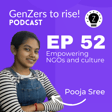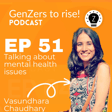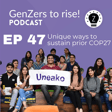
The importance of civic engagement in creating an equitable society
In this episode of the GenZers to rise! Podcast we will be discussing the importance of civic engagement in creating a thriving and equitable society.
Our guest, Jacqueline Azah, an activist, speaker and journalist, shares her insights and experiences on how civic engagement can promote social cohesion, strengthen democratic institutions, and create a more resilient community.
We also discuss ways in which individuals can get involved in civic engagement, the impact it can have on individuals and society, and the challenges associated with it. Stay tuned for a thought-provoking and insightful conversation on civic engagement.
In this episode we cover:
- What are some examples of civic engagement activities? (1)
- How can civic engagement help to strengthen communities? (3)
- What role does civic engagement play in democracy? (3)
You can connect with John Mendez at https://lnkfi.re/jacquelineazah
Follow GenZers to rise! https://go.changemakerz.org/follow
Episode's page https://podcast.changemakerz.org/jacquelineazah
Access exclusive content on the ChangemakerZ app at https://app.changemakerz.org
Produced by Vasilis Skarleas



















